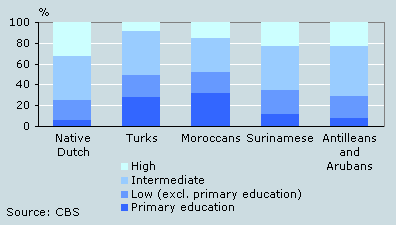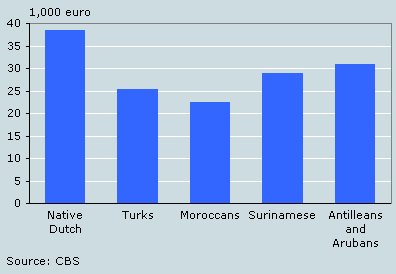
Common problems of immigrants
Education and achievement problems
Immigrant children and young people, whether they are born abroad and are considered first generation immigrants or whether they are born in the Netherlands and belong to the second generation, have to go to school, just like all native Dutch children. But generally it seems that non-Western immigrant pupils and students do not do as well at school than their native peers. It should be said that over the past few years this educational difference is slowly disappearing.
Most important non-Western immigrant groups by level of education and ethnic origin
Immigrant children often start their school career with little knowledge of the Dutch language. When compared to their Dutch peers, there is a language difference of two to two and a half years. Immigrants also tend to choose for shorter and easier disciplines and courses, and more often leave or finish school without any qualifications. Girls generally do better than boys, in particular among young people of Moroccan origin. Turkish pupils start school with the poorest preparation, but make the most progress in primary school. The educational difference between Surinamese students and their Dutch peers has almost completely disappeared. Another positive development is the growing number of immigrant students at institutes for higher education: almost one in five is of immigrant origin. Especially the number of non-Western immigrant women in higher education has strongly increased: in 2006 their number surpassed that of the men.
Unemployment
The unemployment rate for non-Western immigrants of both the first and second generation is higher than that for native Dutch people. In 2007 4.5% of native Dutch people were unemployed against 9.1% of non-Western immigrants. There are many reasons for this difference: a poor knowledge of Dutch, relatively low levels of education, limited work experience and, in some cases, discrimination. A very recent positive development is the fall in unemployment figures for non-Western immigrants. While in 2006 12.4% of non-Western immigrants were unemployed, in 2007 this figure had fallen to 9.1%. Among non-Western immigrant groups, people of Moroccan origin are most likely to be unemployed, while people with a Surinamese background the least.
Poverty
The average non-Western immigrant has less money to spend than the average native Dutch person. Because of high unemployment rates and low labour participation, more non-Western immigrants live in poverty. On average they also earn less than native Dutch workers, because their lower education levels force them to hold low qualification jobs. About one in ten native Dutch families is a low income family against one in three families of non-Western immigrant origin.
Personal income of men aged 25–59 years by ethnic group
Youth crime
Criminality rates are higher than average among young immigrants of non-Western origin. 8% of immigrant youngsters between 18 and 25 years old has been suspected of crime, compared to 4% of their native peers. Young people of Moroccan and Antillean origin are most likely to come into contact with the law. It is generally accepted that there is a relationship between the above-mentioned problems faced by young non-Western immigrants and youth criminality.
>Click here to continue reading about the crisis in the multicultural Netherlands.


